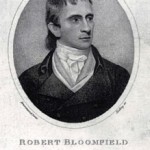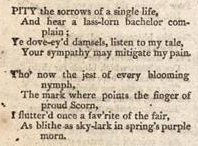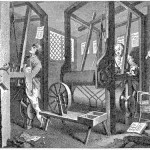When Byron’s first publications did not meet with the favourable reception which they undoubtedly deserved, the young poet wrote one of his most scathing works of satire, English Bards and Scotch Reviewers (1809). In this infamously delightful poem, he not only lampoons the critics who had slighted him, but he also attacks various literary fashions prevalent in what we now know as the Romantic era. Among these is a vogue for “self-taught” poets:
Let Poesy go forth, pervade the whole, / Alike the rustic, and mechanic soul! / Ye tuneful cobblers! still your notes prolong, / Compose at once a slipper and a song; / So shall the fair your handywork peruse, / Your sonnets sure shall please—perhaps your shoes. / May Moorland weavers boast Pindaric skill, / And tailors’ lays be longer than their bill! (ll. 789-798)
This ironic passage contains direct references to poets who were well-known at the time; foremost the tailor’s son and shoemaker Robert Bloomfield, and the “Moorland weaver” Thomas Bakewell from Staffordshire. The Lady’s Magazine, which features representative examples of all literary phenomena of its time, reflects this fad as well, and the former poet is regularly  republished (a euphemism for “pirated”) there. The reasons for their success are too complex to go into in this blog post, but such rurally situated poets without an advanced formal education tended to be popular for two main reasons: (1) their very rusticity, as at this stage of the Industrial Revolution many self-taught poets were indeed still based in the increasingly idealized countryside, far away from the supposedly stifling influence of cities, and (2) they would not be tempted to use the stock phrases, stylistic mannerisms, and intertextual clichés from Classical literature typically acquired through an Augustan education. According to the proto-Romantic myth, which certainly predates the Lyrical Ballads (1798), uneducated equals unspoiled, and these poets would be inspired directly by nature. Much of this is of course problematic as the most successful self-taught poets were arguably more learned than many university graduates today, but one can see why people found the idea attractive.
republished (a euphemism for “pirated”) there. The reasons for their success are too complex to go into in this blog post, but such rurally situated poets without an advanced formal education tended to be popular for two main reasons: (1) their very rusticity, as at this stage of the Industrial Revolution many self-taught poets were indeed still based in the increasingly idealized countryside, far away from the supposedly stifling influence of cities, and (2) they would not be tempted to use the stock phrases, stylistic mannerisms, and intertextual clichés from Classical literature typically acquired through an Augustan education. According to the proto-Romantic myth, which certainly predates the Lyrical Ballads (1798), uneducated equals unspoiled, and these poets would be inspired directly by nature. Much of this is of course problematic as the most successful self-taught poets were arguably more learned than many university graduates today, but one can see why people found the idea attractive.
The assumptions on which it rests suited periodicals like the Lady’s Magazine, which relied for most of its content on myriads of amateur reader-contributors, whose confidence would naturally have been boosted by the example of “rustic and mechanic souls” turned poet. Despite the superficially democratic new taste, getting published was not easy for poets lacking connections in the literary trade, and the platform offered by the magazine was for many a welcome opportunity. The readership of the magazine was found across the United Kingdom and notably in every English county, and this means that it could be of special use to those authors who next to no connections also had a disadvantageous geographical situation. Perhaps many had hopes for more than occasional publication in a women’s monthly, but as the magazine was such a commercial success, you could achieve some form of celebrity even if you never got published elsewhere.
One reader-contributor who achieved moderate success within the magazine was the Suffolk-based “weaver poet” John Webb (1768-1840). Thanks to a few preserved personal documents we know more about him than about most other authors. Webb was an exceptionally productive contributor, publishing dozens of poems and causeries for the magazine from 1800 to 1818. These poems are mostly derivative lyrics that evoke bestselling poets of the period, and the causeries are moral reflections, often occasioned by walks around (the almost proverbial) country churchyards. Webb tells us in the handwritten memoirs that he left us, which were never published, that he was a pious man, likely a Presbyterian, belonging to the Nonconformist community of the town of Haverhill where he would be buried at the Independent Church.
The aforementioned autobiographical document, though somewhat self-aggrandizing, is a great source on the motivations of reader-contributors like Webb to write for the magazine. Webb tells us that he was born into a family long-established in the fustian trade, who appear to have been respected artisans. The region had a tradition of textile manufacturing, and from the difference between his status in his early youth and the relative prosperity that he implies for himself near the end of his life, it would appear that the family had profited by the momentous transition from handloom to powerloom weaving, which occurred throughout Webb’s professional life. At any rate, the man who says that he wrote most of his early poetry under the tutelage of a former “journeyman weaver” who taught him his letters and not much more at the parish school, soon was making frequent business trips to London, where all of his children would come to live. It is fascinating that he continues to present himself nevertheless as a “weaver poet” throughout that time, despite the fact that he would have progressed in financial status and social habitus, in his later work for instance referring to opera singer Angelica Catalani, whom he is unlikely to have heard at a humble church social back home in Haverhill. That he continues to exploit this image repeatedly by referring to it in his poetry, is likely due to more than class loyalty, but also to a desire to participate in the literary fashions of the day, and maybe to take advantage of this good opportunity to market his own work.
Not only did many readers consider the self-taught poets “[r/R]omantic”, a more or less self-conscious presentation of oneself as “self-taught” would also function as a strategy for poets without a public school and university education to position themselves in the literary market, where any sign of deficient breeding was still habitually and ruthlessly picked on; Byron’s snide remarks still being a mild example. Webb wrote two long narrative poems about his hometown that did not appear in the Lady’s Magazine but as privately printed books, entitled Haverhill (1810) and The Market Town (1821), which take their cue from the thematically similar work of George Crabbe (The Village and The Borough). Both touch upon his personal educational history. He cites his sources meticulously, and mentions that after his indifferent schooling with the incompetent schoolmaster, he educated himself further by reading poets such as Milton, Goldsmith, William Whitehead, and Cowper. The preface to Haverhill apologizes ambiguously for any possible faults in the title poem and the shorter pieces appended, stating that most of them “were written while the author moved in the humble sphere of a Journeyman Weaver”.[1] This was commonly understood as meaning that the poet himself had been a journeyman, but this appears never to have been the case: rather, his schoolmaster had been. Although this may seem a detail, it does nuance the class-based profile that Webb constructs for himself. Tellingly, the autobiography is very scanty with details on Webb’s day job, maybe not to burst the bubble, and it is not unimportant that the poet who wrote in The Market Town that his home was “[a]far from London’s proud imperial towers”[2] was to spend so much of his time in the capital. The anonymous critic for the Monthly Review, discussing Haverhill, appears suspicious, and states that “to speak the plain truth, Mr. Webb appears to have been singularly favoured [by the Muses] for a man in his situation in life”.[3] It is indeed probable that he was less rustic than he himself claimed.
Webb says that that after having started his allegedly autodidactic studies of other poets, he soon tried his own hand at poetry, and wanting a forum for his effusions, he naturally turned to the magazines. In 1785, he took advantage of a competition in the Wit’s Magazine (1794-1795), “the conductor of which [Thomas Holcroft – KC] gave four silver medals monthly, to such correspondents as produced the best original essay, tale, etc., or who wrote the best answers to their Prize Enigma”. Webb did not win, but was not deterred by this, and in 1792 went on to publish “many humble attempts at Poetry in the New Lady Magazine [sic], but having entered the nuptial scene […], I hung my harp on the willows, and attended to more important matters”.[4] The periodical that he mentions here is actually the New Lady’s Magazine, a rival publication to the Lady’s Magazine that was published by Alexander Hogg, former associate of Lady’s Magazine publisher Robinson and Co. It followed an editorial policy very similar to that to the Lady’s Magazine, and pirated so much of its content that Hogg was eventually taken to court.

LM XXXIV (Nov 1804). Image © Adam Matthew Digital / Birmingham Central Library. Not to be reproduced without permission.
As he now dedicated himself solely to his family for a few years, we have to wait until the Lady’s Magazine publications for Webb to resurface again, but luckily here his work found a permanent home. The often enthusiastic reader-contributor community appears to have embraced him wholeheartedly, and he even received fan mail. In November 1804 his poem “The Old Bachelor’s Petition” appeared, where he assumes the persona of a “lass-lorn” older man who laments not having gotten married in his youth, which was such a hit that had he wanted to and not already had a wife, our weaver could have wed a spinster. Two sent lengthy replies in verse to Webb, probably by way of the magazine’s publishers, in which they offered him marriage. Mercifully, these amorous epistles were never published in the magazine.
All of this attention must have been flattering, but it is a far cry from establishing a reputation as a poet. At one time, Webb appears to have almost made it, when he published by subscription his first long poem, Haverhill, and by his own admittance was left with a cool £100 after all expenses were paid. Again according to himself, he was visited soon after its publication by Sir George Beaumont, one of the subscribers and the doyen of English art patrons. Beaumont claimed to have shown it to Wordsworth, who in turn would also have thought it a decent poem, and (amusingly) admired the fact that Webb had made so much money out of it. However, nothing much happens after this, presumably because Webb’s first priorities always were his family and business. The Lady’s Magazine may not have secured him a place in the canon, but it must have helped him to attract the support of his generous subscribers.
Dr. Koenraad Claes
School of English, University of Kent
[1] Webb, John. Haverhill, a descriptive Poem, and other Poems. London: privately printed, 1810. n. p.
[2] Webb, John. Poems. London: privately printed, 1859. p. 66
[3] Unsigned. “Haverhill, a descriptive Poem, and other Poems “. Monthly Review Vol. LXII, Nr. 8 (August 1810), pp. 343-344
[4] Webb, John. Autobiography. Manuscript.


My home computer is hooked up to a router. I would like to have access to my home computer’s webcam through my work computer. . My home computer is hooked up through a DSL modem and is always on.. My work computer obviously has access to the Internet..
Great !
Is dating a joke? Women will rest with certain guys but these same ladies will make
a man their dating await sex and make him function for her affection despite the fact that other men didnt need to.
So its easier to marry a complete stranger ?
Thanks ever so much for doing this research. I’m at the Suffolk Records Office now, looking at the papers of John Webb — my great-great-great-great grandfather. This context for his poetic work is very helpful. In reading the autobiography, I concur: he does not seem to have been a “journeyman weaver.” Indeed, reading the poem after reading the autobiography, I chuckled when I encountered his description.
Thanks!
Thanks!
Thanks!
Thanks, it was a good read.